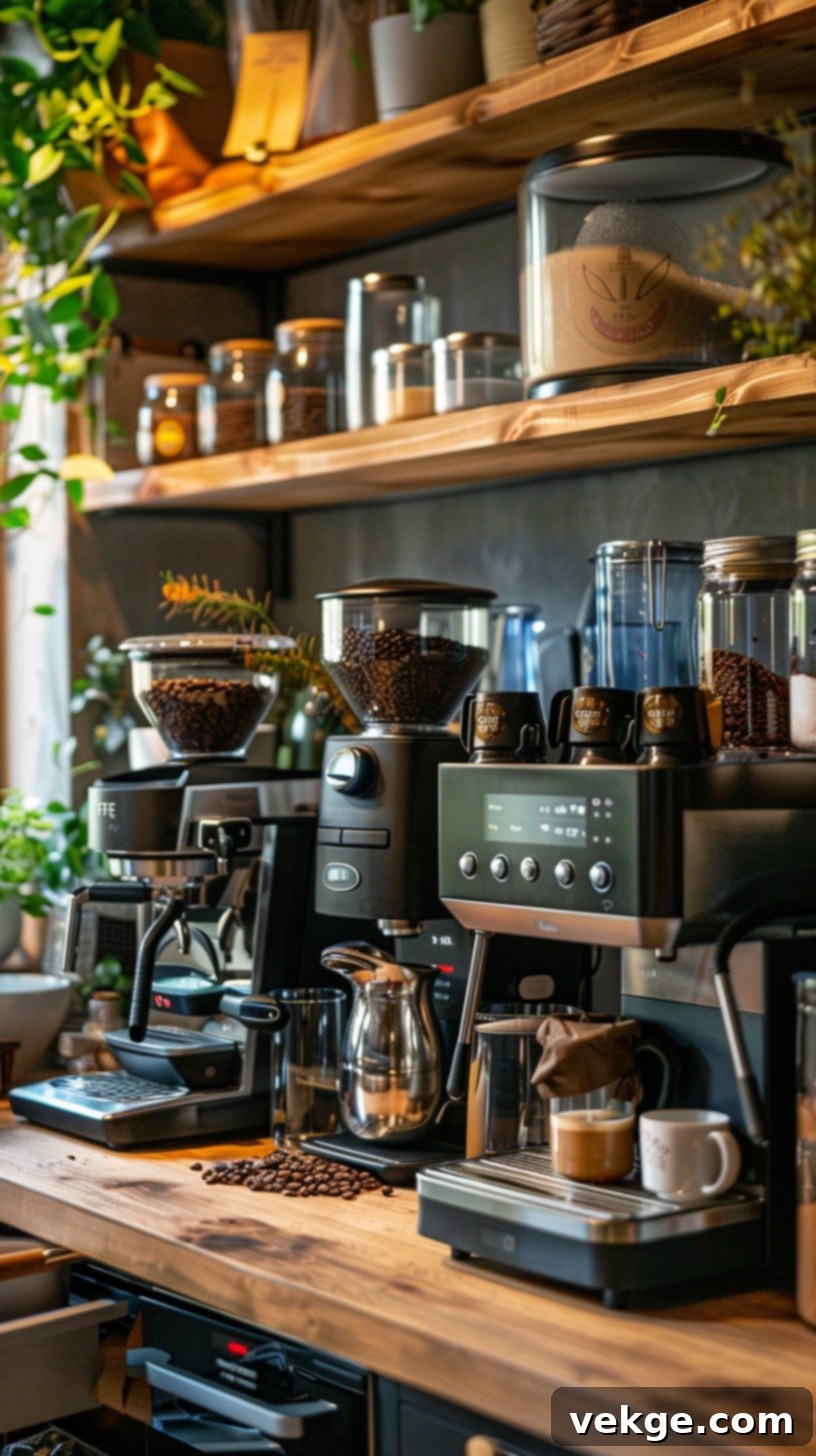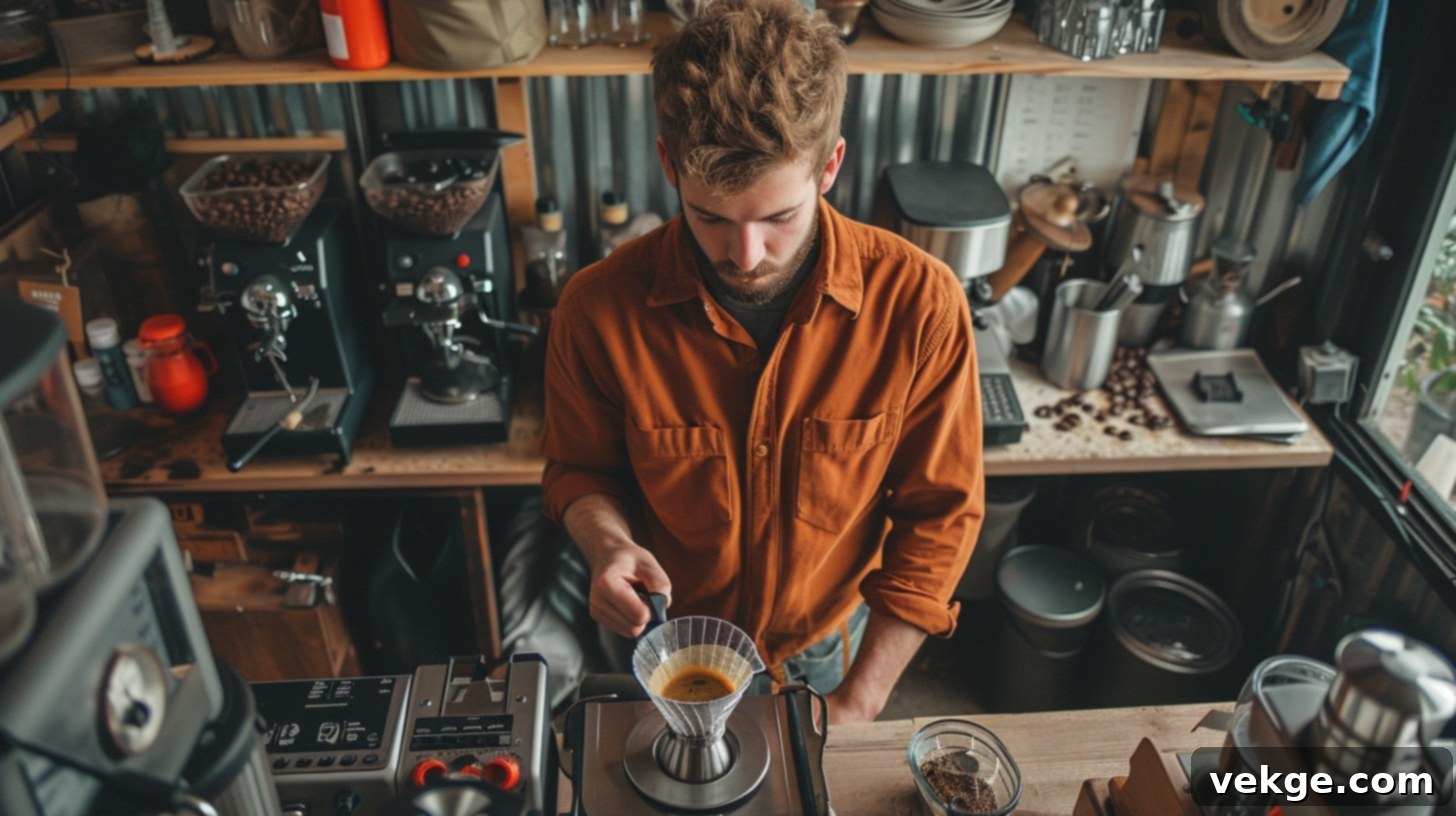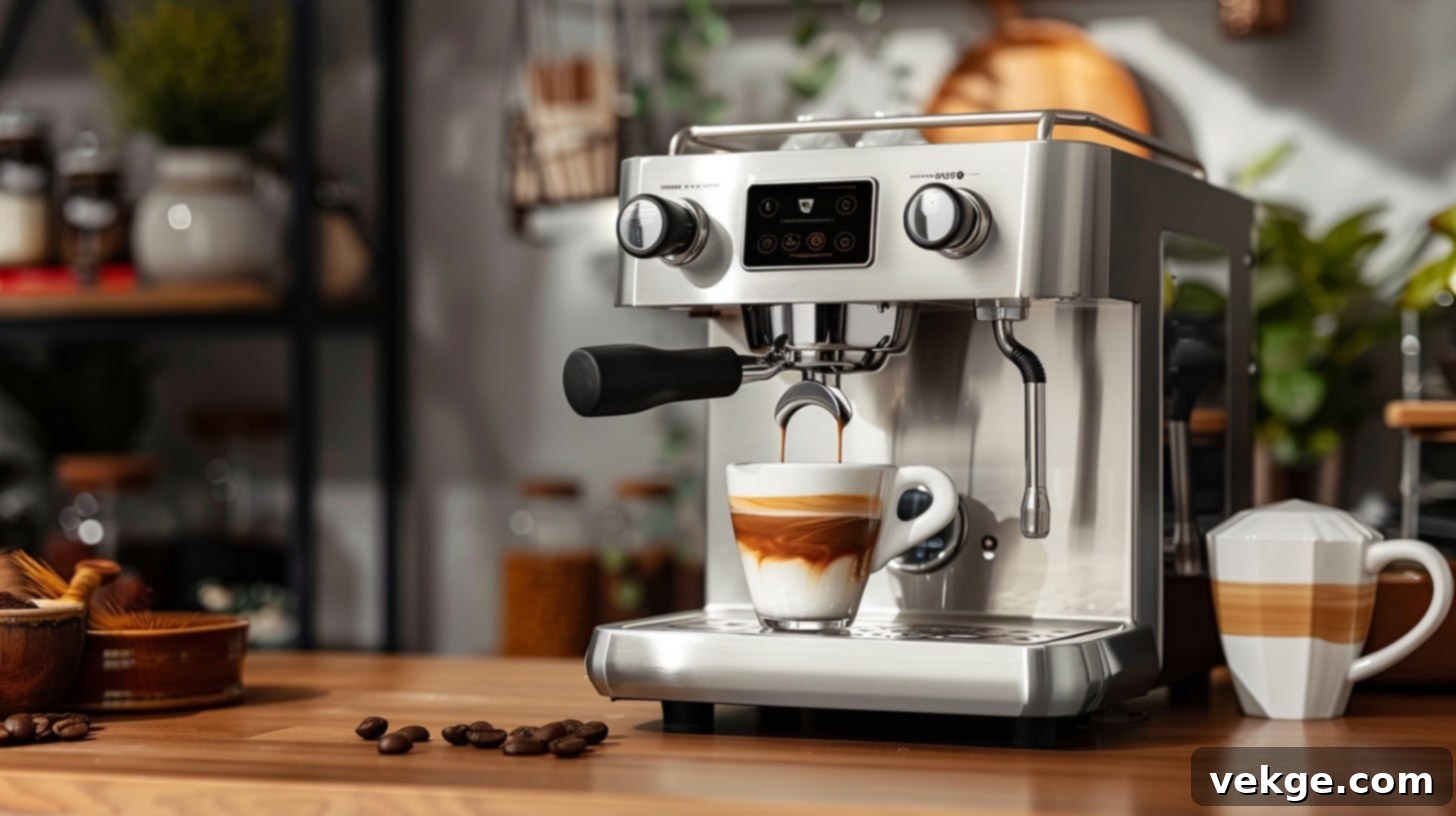The Ultimate Guide to Choosing the Best Coffee Machine for Your Home
Coffee is more than just a beverage; for millions worldwide, it’s a daily ritual, a source of comfort, and a moment of pure enjoyment. With the global demand for coffee continuously rising, so does the interest in high-quality home coffee machines. The market is flooded with new models and innovative types, making it both exciting and challenging to find the right fit. Whether you’re a seasoned coffee connoisseur who grinds your own beans or a casual drinker just beginning your journey into the world of home brewing, selecting the perfect coffee machine can profoundly transform your everyday cup and elevate your entire coffee experience.
This comprehensive guide is designed to simplify your decision-making process. We’ll walk you through the essential steps involved in choosing a coffee machine that perfectly aligns with your personal needs, brewing preferences, and lifestyle. By understanding the various options and key considerations, you’ll be empowered to make an informed, confident, and stress-free choice, ensuring every sip is a delight.
Why Invest in a Home Coffee Machine?
Bringing the cafe experience into your kitchen is a rewarding investment, far beyond simply buying another appliance. Investing in a home coffee machine is about reclaiming control over your coffee experience and customizing it to your exact specifications. Here’s why it’s a game-changer:
- Personalized Perfection: Say goodbye to generic coffee shop offerings. With your own machine, you can experiment endlessly with different coffee beans, roasts, grind sizes, and brewing temperatures. This allows you to discover and consistently brew your ideal cup, tailored precisely to your taste buds.
- Significant Cost Savings: While the initial outlay for a quality coffee machine might seem considerable, it pales in comparison to the long-term savings. A daily coffee habit from a cafe can quickly add up to hundreds, if not thousands, of dollars per year. Brewing at home drastically reduces this expense, offering a substantial return on your investment over time.
- Unmatched Convenience: Imagine waking up and having your favorite brew ready in minutes, without leaving the comfort of your home. No more waiting in lines, commuting, or dealing with unexpected shop closures. Your perfect cup is always just steps away, whenever you desire.
- Quality Control and Freshness: When you brew at home, you control the freshness of your beans, the quality of your water, and the cleanliness of your equipment. This direct control ensures a superior-tasting coffee free from unwanted additives or stale ingredients often found in pre-ground options.
- Embrace the Ritual: For many, the act of brewing coffee is a meditative ritual. From grinding the beans to observing the extraction, it’s a sensory experience that can add a calming and enjoyable start to your day.
With such a vast array of coffee machines on the market, from simple drip makers to sophisticated espresso systems, the challenge isn’t whether to buy one, but rather, how to choose the right one for you.
5 Popular Types of Coffee Machines Explained

Before diving into specific models or brands, it’s crucial to understand the fundamental types of coffee machines available. Each category offers a unique brewing method, resulting in distinct flavor profiles and levels of user interaction. Knowing these differences will guide you toward the best choice for your preferred coffee style and lifestyle.
1. Drip Coffee Makers
Drip coffee makers are the workhorses of many kitchens, perfect for those who prioritize simplicity and capacity. They operate by heating water and dripping it over a bed of ground coffee held in a filter, collecting the brewed coffee in a carafe below. They are ideal for households that consume multiple cups of coffee daily or for entertaining.
- Pros: Affordable initial cost, incredibly easy to use with minimal fuss, excellent for brewing large batches (several cups at once), consistent results without much effort.
- Cons: Limited customization options for brewing parameters, generally produce a less complex or nuanced flavor compared to other methods, often lack features for specialty drinks.
2. Single-Serve Coffee Machines
Designed for ultimate convenience and speed, single-serve coffee makers utilize pre-packaged pods or capsules to brew individual cups of coffee. They are perfect for individuals on the go or those who enjoy a variety of different flavors without the commitment of a full pot.
- Pros: Exceptionally fast brewing, incredibly simple operation (often just a press of a button), wide variety of flavors and beverage types (coffee, tea, hot chocolate), easy cleanup.
- Cons: Higher ongoing cost due to proprietary pods/capsules, significant environmental impact from non-recyclable plastic pods, limited control over brewing parameters, potential for less fresh-tasting coffee compared to freshly ground beans.
3. Espresso Machines
For the true coffee aficionado who craves rich, concentrated flavor and enjoys crafting specialty drinks like lattes and cappuccinos, an espresso machine is essential. These machines force pressurized hot water through finely ground coffee, producing a shot of espresso – the foundation for countless coffeehouse favorites. They come in manual, semi-automatic, and fully automatic variations, offering varying degrees of control and convenience.
- Pros: Produces high-quality, intense espresso shots, offers immense versatility for creating a wide range of milk-based drinks, allows for significant control over the brewing process (especially semi-automatic and manual models), can be a deeply rewarding experience for enthusiasts.
- Cons: Can be significantly more expensive than other types, often requires a learning curve to master, demands more maintenance and cleaning (especially milk frothers), takes up considerable counter space.
4. French Press
While technically a brewing method rather than a machine, the French press is a beloved classic technique cherished by those who appreciate a full-bodied, robust cup of coffee. It involves steeping coarse-ground coffee in hot water and then pressing a plunger to separate the grounds from the brewed coffee. No electricity is needed, making it highly portable.
- Pros: Produces exceptionally rich, full-bodied coffee with a distinct flavor, affordable and durable, requires no electricity (great for camping or travel), simple design and easy to clean.
- Cons: Brewing process takes more time and manual effort, results in some sediment in the cup, not suitable for making espresso or milk-based drinks, requires precise grind size for best results.
5. Cold Brewers
Specifically designed for those who prefer their coffee cold, cold brew makers steep coarse-ground coffee in cold water for an extended period (12-24 hours). This slow, low-temperature extraction results in a smooth, naturally sweeter, and significantly less acidic coffee concentrate, perfect for iced coffee lovers or warmer climates.
- Pros: Produces a remarkably smooth, low-acid, and naturally sweet coffee concentrate, excellent for making refreshing iced coffee or coffee cocktails, concentrate can be stored in the fridge for an extended period, gentle on sensitive stomachs.
- Cons: Requires a long brewing time (hours), typically only makes cold coffee, dedicated device primarily for one type of beverage, generally produces a less intense aroma than hot brewed coffee.
Key Factors to Consider When Choosing Your Coffee Machine

Choosing the perfect coffee machine goes beyond simply admiring its aesthetics; it’s about deeply understanding your own coffee habits, lifestyle, and preferences. By carefully evaluating the following factors, you can narrow down your options and find a machine that truly enhances your daily routine.
1. Your Budget: Initial Cost vs. Long-Term Value
Before you even begin browsing, establish a realistic budget. Coffee machine prices vary dramatically, ranging from under $50 for basic drip makers to several thousands for high-end automatic espresso machines. Remember to consider not just the initial purchase price, but also ongoing costs. For example, single-serve machines might be cheaper upfront but incur higher costs due to recurring pod purchases. Conversely, an espresso machine might be a larger investment but allows you to save on daily cafe visits. Think about how often you’ll use the machine and what your priorities are in terms of features and quality. Sometimes, spending a little more upfront for durability and desired features can save you money and headaches in the long run.
2. Ease of Use and Convenience
Consider your willingness to engage with the brewing process. Are you seeking a machine that handles everything for you with the touch of a button, or do you enjoy the hands-on ritual of crafting your coffee? Super-automatic espresso machines and single-serve brewers offer maximum convenience. However, if you find satisfaction in the art of brewing, a semi-automatic espresso machine or a French press might offer a more rewarding and customizable experience, despite requiring more effort. Evaluate how much time you’re willing to dedicate to preparing your coffee each morning.
3. Available Space and Kitchen Aesthetics
Coffee machines come in all shapes and sizes. Before making a purchase, measure your available counter space, including the height clearance under overhead cabinets. If kitchen space is limited, compact models like certain single-serve machines or a French press might be a better fit. Consider the machine’s design and how it will integrate with your kitchen’s overall aesthetic. Some people prefer sleek, modern designs, while others might lean towards a more retro or industrial look. Remember to account for space needed for accessories like grinders, milk frothers, and bean storage.
4. Maintenance and Cleaning Requirements
Every coffee machine requires some level of cleaning and maintenance to ensure optimal performance and longevity. Consider how much time you are willing to spend on these tasks. Machines with integrated grinders, milk frothers, or complex plumbing systems (like espresso machines) generally demand more frequent and thorough cleaning. Descaling, emptying spent grounds, and cleaning milk wands are common tasks. Some machines offer self-cleaning cycles or removable parts that are dishwasher-safe, which can significantly reduce the cleaning burden. Neglecting maintenance can lead to poor coffee taste and reduce the lifespan of your appliance.
5. Your Personal Coffee Preferences
This is arguably the most critical factor. What kind of coffee do you genuinely enjoy most often? Do you crave the intense, concentrated shot of espresso, or do you prefer creamy lattes and cappuccinos? Are you a fan of a simple, robust black coffee, or do you lean towards smooth, low-acid cold brews? Different machines excel at different things: espresso makers offer versatility for specialty drinks, drip coffee makers are perfect for straightforward brews, and cold brewers are specialized for iced coffee. If you enjoy a variety of drinks, look for machines with versatile features like integrated milk frothers or the ability to brew different strengths.
6. Capacity and Serving Needs
How many people in your household drink coffee, and how many cups do you typically consume in a single brewing session? If you’re brewing for one, a single-serve or small French press might suffice. For a family of coffee drinkers or frequent entertaining, a drip coffee maker with a large carafe (10-12 cups) or a multi-cup espresso machine would be more practical.
7. Additional Features and Technology
Today’s coffee machines come with a plethora of extra features that can enhance convenience and customization. Consider if you need a built-in grinder for the freshest possible taste, a programmable timer to wake up to freshly brewed coffee, a milk frother (manual or automatic) for lattes and cappuccinos, or even smart features that allow control via an app. While these additions can increase the cost, they often offer significant value in terms of convenience and expanded beverage options.
8. Brand Reputation and Warranty
Researching reputable brands known for their quality, durability, and customer support can provide peace of mind. Look for brands with good reviews and a reliable warranty period. A robust warranty indicates the manufacturer’s confidence in their product and provides protection against potential defects or issues.
Choosing the perfect coffee machine for your home is ultimately about aligning your personal preferences, budget, and lifestyle with the right equipment. Whether you’re a busy professional seeking a quick, convenient cup or a dedicated enthusiast who relishes the art of coffee making, there’s an ideal coffee machine out there waiting for you. Remember, the “best” coffee machine isn’t necessarily the most expensive or feature-rich; it’s the one that consistently meets your needs, fits seamlessly into your daily life, and genuinely enhances your coffee experience every single day.
Armed with this comprehensive guide, you are now well-prepared to confidently navigate the market and make an informed decision. So, take your time, explore your options thoroughly, and most importantly, enjoy the exciting journey of finding your perfect coffee partner!
